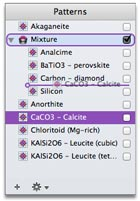

Since the males will be sterilized, they induce cytoplasmic incompatibility (Werren et al. There are four blood types: A, B, AB, and O. Firstly, by infecting male mosquitoes with Wolbachia then releasing them to mate females. and ABO blood incompatibility during pregnancy. You should rebuild the package with the outdated numpy C API usage, e.g. There are two types of incompatible blood types during pregnancy: Rh incompatibility.
#Crystaldiffract incompatbility code#
When running code that uses pycocotools, its current installation relies on the updated numpy C API, yet the numpy version was downgraded which would result in the error.As a result, numpy=1.21.2 is uninstalled and the older version is installed.
#Crystaldiffract incompatbility install#
tensorflow=2.6.0 which would try to install numpy=1.19.5. At a later point pip needs to install a package that has a requirement for an older version of numpy, e.g.This package is now compatible with numpy 1.21.2 C API. It then builds a package that depends on numpy and its C API, e.g.pip figures out that it needs to install numpy and it chooses the latest version, 1.21.2 as of the time writing this answer.Given that pips dependency resolver doesn't guarantee any order for installing the packages, the following might happen: There are packages that rely on this C API when they are being built, e.g. Good example is the case when you're using tensorflow=2.6.0 which isn't compatible with the newest numpy version (it requires ~=1.19.2).Īs already mentioned in FZeiser's answer, there was a change in numpys C API in version 1.20.0. While upgrading the numpy version would often solve the issue, it's not always viable.

use minmum supported numpy version in pyproject.toml ( oldest-supported-numpy)įor a more detailed discussion of potential solutions, see.But if one uses an installed version numpy=1.20.0 (The other way around it should not matter, because of backwards compatibility. If the build version used in 1.20, this will lead to an error. In some cases, pip seems to download the latest version of numpy for the build stage, but then the program is run with the installed version of numpy. There was a change in the C API in numpy 1.20.0. However, I thought some background might be interesting - and provide also alternative solutions. Multi-processing allows for fast profile simulation, and real-time adjustment of. Choose one of four preset simulation types: constant-wavelength X-rays, neutrons energy-dispersive X-rays or time-of-flight neutrons. Indeed, (building and) installing with numpy>=1.20.0 should work, as pointed out e.g. CrystalDiffract provides powerful x-ray and neutron powder diffraction simulation capabilities: but is quick and easy to use.


 0 kommentar(er)
0 kommentar(er)
